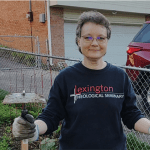Pentecost is political? If you’ve clicked this far, you’re probably either angry, in agreement, or curious as to why I say that. I know that just mentioning the word “political” in a religious setting can be off-putting to some. Church should stay out of politics, right?
Allow me to clarify what I mean when I use the word “political.”
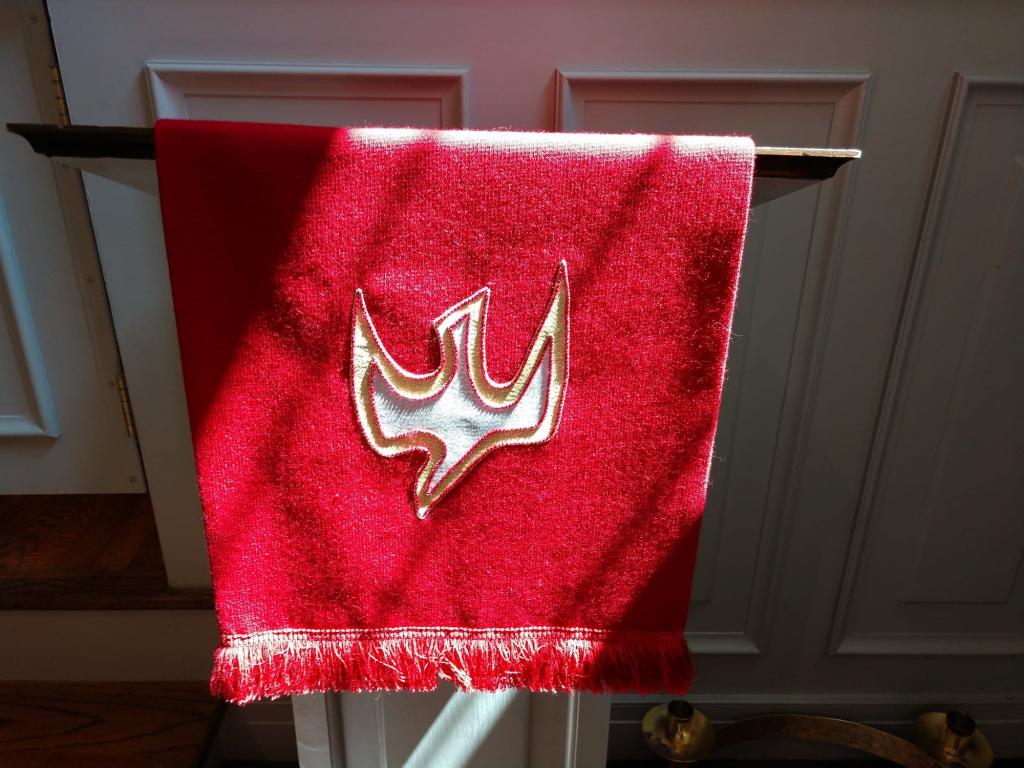
Or, rather, what I don’t mean. I’m not talking about political parties or political affiliations – Democrats or Republicans, Independents or Libertarians. I’m talking about politics in its original sense: the concerns of the people. The Greek word polis means “citizenry.” It’s about how we live and work and make decisions together as a community.
So when I say Pentecost is political, I mean that this event that happened over two thousand years ago had implications for the public concerns of that time. I mean that the sending of the Holy Spirit to the disciples in that upper room had ramifications for the whole society. It started out as a private event of worship among a very small group of people. But the Holy Spirit blew them right out into the public square where they started speaking in the languages of people from faraway places. They began communicating with the public about the life-changing, world-freeing, death-breaking love of Jesus Christ.
So, yes, Pentecost is political – thanks be to God! Amen, right?
Wait. Why would we give thanks for Pentecost being political?
When the church engages in the public square, things can get uncomfortable quickly. Look what happened to those disciples when they started talking about the gospel to their community. People thought they were weird, that something was wrong with them. They started saying all kinds of mean things to them and about them. They accused them of being drunk, disparaging their character.
Later, when they started traveling across the Mediterranean region telling people that Jesus’ resurrection frees them from oppression, some of them were jailed. Others were beaten and even killed. All of them found themselves at odds with the culture and the social norms. The structures of sin both within the religious system and outside in the economic and military systems did everything they could to shut them up, shut them down, and shut them out.
Well. That’s no fun.
Can’t we just stay here in the upper room and watch the tongues of fire dance over our heads?
Isn’t it enough to just sing our nice hymns, and listen to the polite parts of Scripture? Can’t we just say nice prayers, and have coffee and donuts in the narthex when we’re done? Or just click off the livestream and go about our day?
Sure, we can do that. Many Christians do that. Most Christians do that.
But is that really the kind of Christian you want to be? Is that the kind of church you want to be?
What would it be like to belong to a church that is not afraid to invite the Holy Spirit into their hearts and minds, into their meetings and your Bible studies? How might it be to have a congregation explore the political nature of our Pentecost faith?
For example, I’m hearing about many churches who are engaging the Holy Spirit by trying to understand systemic racism. They’re doing book studies on James Cone’s The Cross and the Lynching Tree or Carolyn Helsel’s Anxious to Talk About It: Helping White Christians Talk Faithfully about Racism. Or Dear Church: A Love Letter from a Black Preacher to the Whitest Denomination in the U.S. by Lenny Duncan.
If your church is doing this, it means that your congregation as a whole is becoming aware of the ways in which the church in America has not only been complicit with slavery and racism but was actually one of the architects of these systems since this country’s founding. (Think this isn’t true? Read White Too Long: The Legacy of White Supremacy in American Christianity by Robert P. Jones.)
You’re also learning that just doing book studies isn’t enough. Just being nice to everyone no matter their skin color isn’t enough.
Those are good places to start. But the wind of the Holy Spirit is compelling you to go out into the public square to live out this faith so that it makes a difference for people who are harmed because of the color of their skin. Pentecost is political – thanks be to God!
That little tongue of fire dancing over your head is giving you the language and the courage to say important things that need to be said. Things like: the church must do its part to dismantle the systems of racism that are hurting and killing black and brown and Asian bodies. We as Christians must collectively speak out against discrimination and police brutality. We must call for restructuring our education and healthcare systems and our gerrymandered voting districts so that all communities are treated with equity. And we must advocate for justice, equity, diversity, and inclusion at every level – in our workplaces, in our government, in the business community, and especially in our churches.
Some of you are doing just that!
Many Christians joined protests after the murder of George Floyd last year. Those protests involved people from all walks of life to speak up and speak out for Black Lives Matter. Just like that day of Pentecost where a crowd gathered there in Jerusalem who had come from all nations for the Jewish celebration of Shavuot – God’s gift of the Ten Commandments given to Moses. You can imagine that scene – the street filled with light skin, dark skin, bronze skin, pale skin. Exotic clothing. All different styles of hair. And such a mish-mash of languages and dialects.
Pentecost is political – thanks be to God!
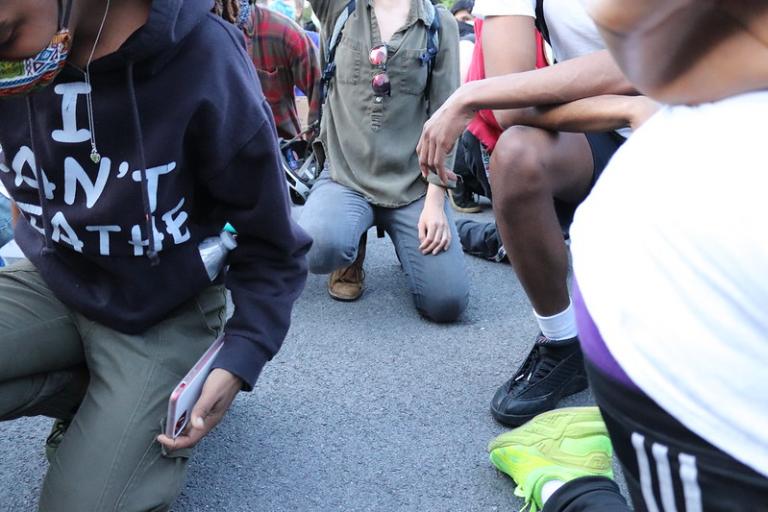
I think about that day of Shavuot/Pentecost when I look back on pictures of those scenes of people gathered in protest around the country over last year. Of course, the reasons for those gatherings were not to celebrate, but to protest the deaths of God’s precious children. People came to these protests from all walks of life. Streets were filled with skin colors of all kinds speaking out against the terror being inflicted upon the descendants of slaves. People are demanding that their leaders no longer ignore the injustices that exist in our communities.
That’s why I am always happy to hear about local ministeriums and faith-based community organizers who collectively address local justice issues.
For example, here in Lexington, Kentucky, where I live, there is an organization called BUILD – Building a United Interfaith Lexington through Direct-action. BUILD is comprised of diverse congregations in the Lexington area that come together to do justice and to powerfully address community problems. They hold community meetings and focus on a single issue to address each year, culminating in the Nehemiah Action event where they invite city officials to hear the concerns of people of faith.
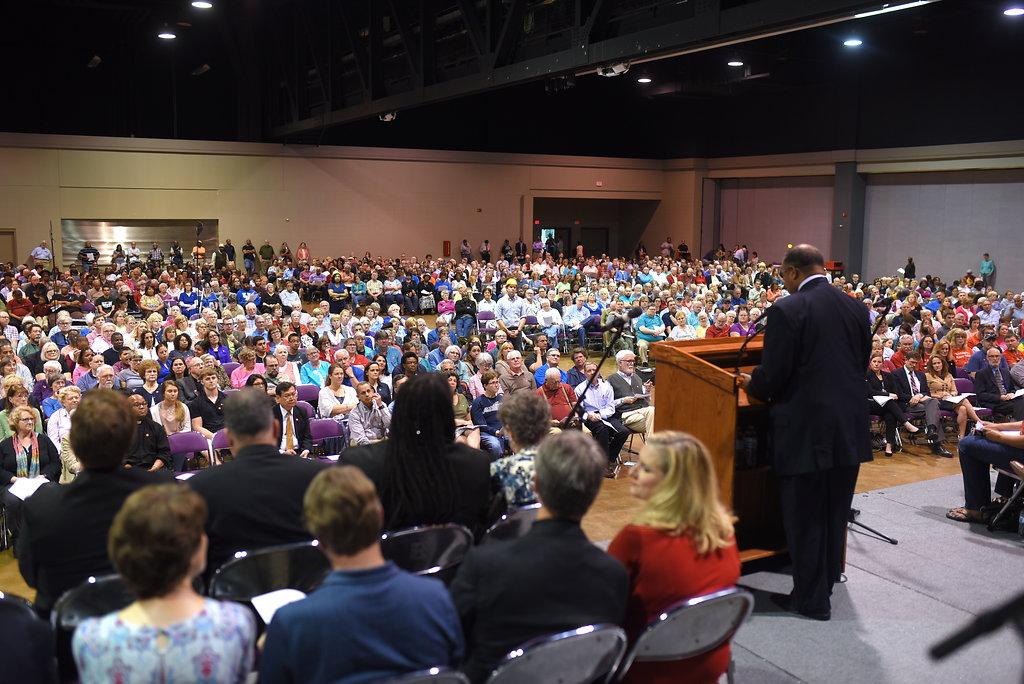
I attended one of these events before Covid and it is an electrifying gathering with music and prayer and testimony. Hundreds of people from all kinds of congregations come together to hold our governing officials accountable and invite them to address the issue at hand, whether it’s violence, or lack of affordable house, or improved public transportation. We might say that this is a Pentecost-type event. People from all different races, cultures, and languages unite for a common call for justice. Pentecost is political – thanks be to God!
A Pentecost Church is one that stands with their siblings and speaks with one voice for peace and justice – even when those voices are in different languages.
And a Pentecost Church strives to listen and understand what it’s like for their neighbors who live with prejudice and unfair treatment.
What are we hearing? Who are we willing to listen to?
My guess is that if you’ve gotten this far in reading this essay, you are already doing a great deal to be a Pentecost church. And I’m going to challenge you to do even more. I’m challenging you to speak out alongside those who do not enjoy the same privileges as you whether that is because of skin color, or gender, or sexuality, or religion, or age, or body type, or country of origin.
I invite you to ask yourself: what are our next steps for being a Pentecost church?
Maybe you can join a movement such as the Poor People’s Campaign or SURJ (Standing Up for Racial Justice). These groups can help us become allies in dismantling the racist structures of our society. Maybe some of you who are ready to take your faith-in-action to the next level can explore the resources in the group Faith in Public Life, one of the largest public-action faith networks in the country. Or maybe you can ask a representative from your denomination working on racial justice to meet with your church. They can help you strategize for becoming an anti-racism congregation.
Whatever the next steps are for you individually or as a congregation, I think you’re ready!
Maybe your pastor is already raising these kinds of issues in their prayers and sermons. Or maybe you’re one of those pastors. And maybe people squirm a bit when the sermon “goes there.” But remember – this is what clergy promised to do in their ordination vows. For example, Presbyterian Church (USA) asks pastors at their ordinations: Will you in your own life seek to follow the Lord Jesus Christ, love your neighbors, and work for the reconciliation of the world? They promise with the help of God to do this, and to do this with their congregations.
We can, we must, be a Pentecost church that models itself on the first Pentecost church – a group of people who followed a crucified and risen Jesus.
Like them, we must confront injustice and political differences with ethical and moral resolve.
Remember that Jesus described the Holy Spirit as the Advocate – the one who acts for justice and righteousness (John 14:26). This is the role of the Holy Spirit out in the world bringing people together across cultures and religions and languages. Just like on the day of Pentecost when 3000 people from across the land were brought together by the work of Jesus Christ in and through the Holy Spirit.
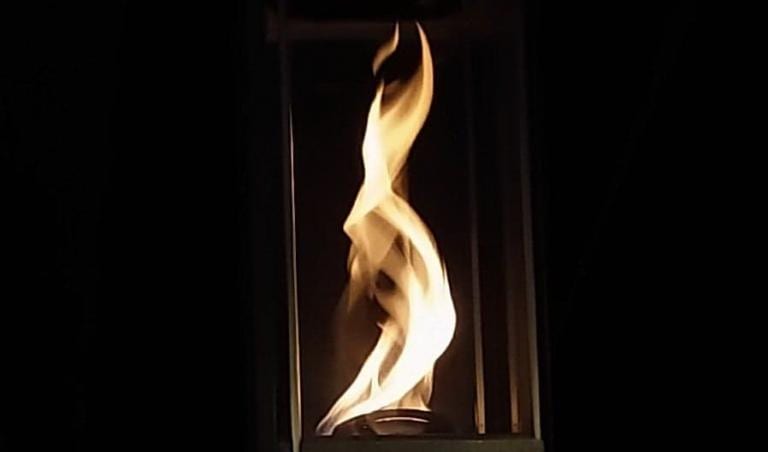
The gift of speaking the gospel of Jesus Christ did not end on that day of Pentecost. You can speak in your own tongue of fire about God’s deeds of power!
I pray that the Holy Spirit will touch you and the entire church this day. I pray the the Spirit of Pentecost will move through our breath and heart and mind and body to feel that power of God in Jesus Christ. Pentecost is political – thanks be to God!
Read also:
Will White Churches Find Their Pentecost Courage?
La Lengua de Dios: Pentecost and the Language of God

Leah D. Schade is the Assistant Professor of Preaching and Worship at Lexington Theological Seminary in Kentucky and ordained in the ELCA. Dr. Schade does not speak for LTS or the ELCA; her opinions are her own. She is the author of Preaching in the Purple Zone: Ministry in the Red-Blue Divide (Rowman & Littlefield, 2019) and Creation-Crisis Preaching: Ecology, Theology, and the Pulpit (Chalice Press, 2015). She is the co-editor of Rooted and Rising: Voices of Courage in a Time of Climate Crisis (Rowman & Littlefield, 2019). Her latest book, co-written with Jerry Sumney is Apocalypse When?: A Guide to Interpreting and Preaching Apocalyptic Texts (Wipf & Stock, 2020).
Twitter: @LeahSchade
Facebook: https://www.facebook.com/LeahDSchade/



